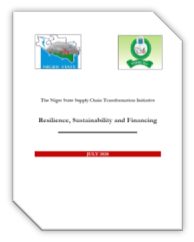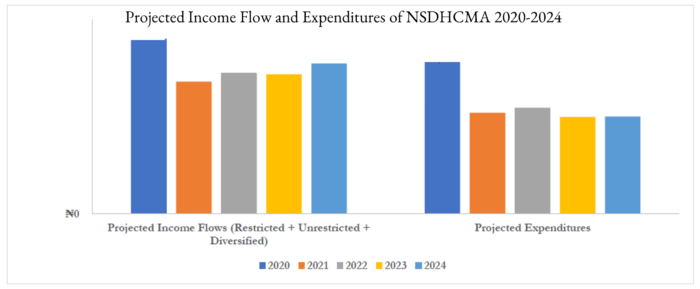Sustaining the Niger State supply chain transformation initiatives beyond donor support
Challenge
Financial contributions made to a health supply chain system are multifaceted. Niger State’s system relied heavily on donor funding, but donations were insufficient to fund a supply chain transformation initiative (SCTI) and had inevitable consequences for implementing a self-sufficient supply chain. Ultimately, the State lacked a long-term funding plan for its health supply chain.
Activity
 Pamela Steele Associates (PSA) supported Niger State’s development of a 5-year Financial Sustainability Plan that identified strategies for securing new sources of income, focusing on the areas of the SCTI with strong potential.
Pamela Steele Associates (PSA) supported Niger State’s development of a 5-year Financial Sustainability Plan that identified strategies for securing new sources of income, focusing on the areas of the SCTI with strong potential.
To ensure financial sustainability of the SCTI, PSA examined each element, conducted research into its feasibility, and explored the costs involved.
The plan aimed to place the Niger State Drugs and Hospitals Consumables Management Agency (NSDHCMA) on the pathway to financial self-sufficiency within five years, while enhancing the internal financial resilience of Niger State’s supply chain.
The FSP focused on four key intervention areas in line with the government’s strategic plan:
- Increased data transparency – crucial for effective decision-making and continuous improvement;
- Better product availability;
- Promoting the NSDHCMA as a learning organisation;
- Capitalising on private sector capacity.
To support the NSDHCMA in implementing the FSP, PSA also provided extensive training to ensure organisational capacity development in a number of critical areas, including: fund management, budget management and tracking, gap analysis, resource mobilisation capabilities and performance regarding judicial allocation.
Result
NSDHCMA began implementing the FSP by diversifying into extemporaneous production and establishing contracts with local manufacturing companies. These companies supply essential short-term medical products, such as paracetamol syrups, antacid suspensions, and sanitisers.

In the FSP, the projected income for the NSDHCMA increases annually from 2020 to 2024. This positive scenario is directly linked to the anticipated funding from the implementation of the MTSS 2021–2023, under which the Agency is expecting to receive substantial funding for essential medicines procurement (DRF), and the resulting cost recovery through a mark-up on sales to health facilities, as well as funds from the contributory health scheme.
High expenditure is observed in 2020, resulting from the capital expenditure on warehouse renovation to pharma-grade, procurement of production equipment, raw materials, and QC reagents, payment for 3PL services, and refurbishment of the infusion plant.
The FSP transformed the NSDHCMA’s position in the business landscape through its rigorous emphasis on financial sustainability.
Download the full Nigeria Programme Brochure for more information >